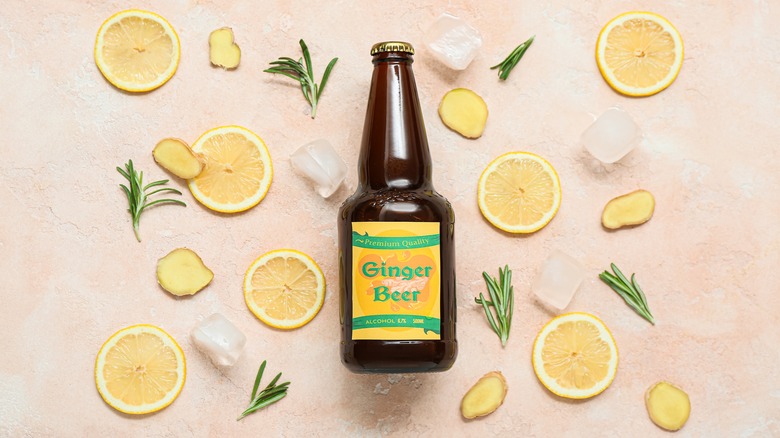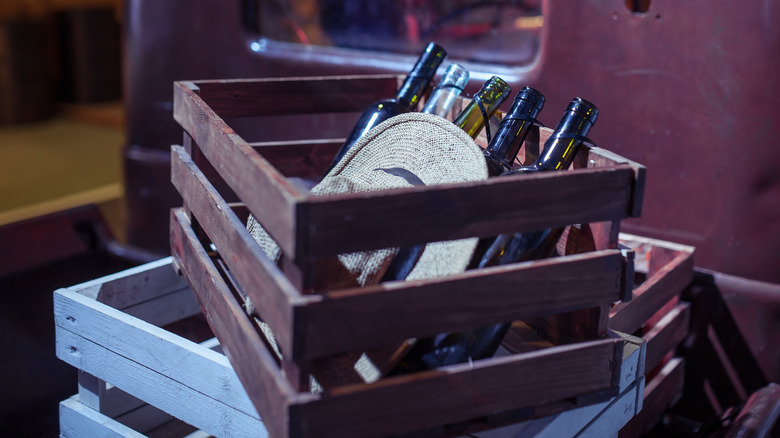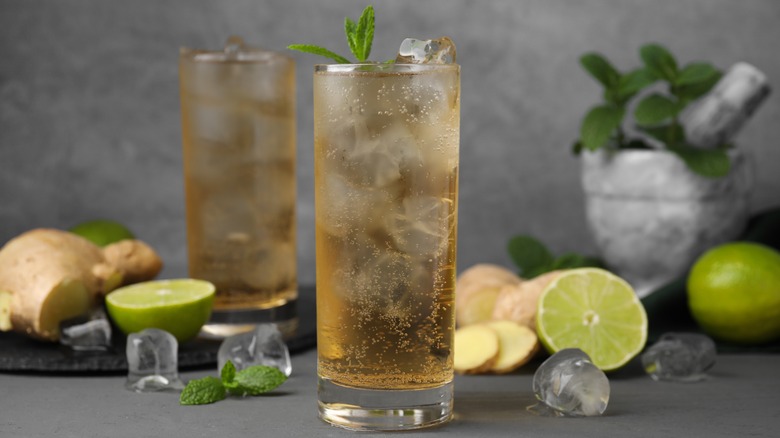Why Your Favorite Can Of Ginger Beer May Contain Some Alcohol
Ginger beer is a piquant, fizzy beverage that goes well in a variety of cocktails (not to mention some great mocktail ideas), but it's also totally delicious to drink all on its own. The next time you crack open a can of the good stuff, though, you might want to check the label, as it's possible that your technically non-alcoholic ginger brew actually contains trace amounts of alcohol.
The reason? Some ginger beers are actually brewed, meaning their ingredients (typically sugar, ginger, either fresh or in the form of extract, and water) are put through a fermentation process, which does create a little bit of alcohol. That said, brewers are careful to ensure that their ginger beer contains no more than 0.5% alcohol, or else the company making it would have to categorize the beverage in a completely different way and have a whole lot more hoops to jump through.
If you were wondering if your ginger ale (as opposed to ginger beer) might contain alcohol, the answer is no, not ever. Ginger ale is never made through fermentation; rather, it's made by adding ginger flavoring to carbonated water.
Ginger beer began as an alcoholic beverage
Ginger beer is actually hundreds of years old, with its origins in 1700s England, specifically Yorkshire. It was called "beer" because its production process resembled that of actual beer, with all the ingredients mixed together (in this case, ginger, water, sugar, and cream of tartar, with the occasional touch of lemon, or sometimes citric acid) and left to ferment.
Most important to this fermentation process was the use of what was known as ginger beer plant, a mixture of essential bacteria and yeast. When the ginger beer was bottled, some of the liquid would be saved in order to help ferment the next batch. Early ginger beer could reach as high as 11% alcohol (that's 22-proof).
Ginger beer continued to be made as an alcoholic beverage until the 1920s, when Prohibition in the U.S. began. Under new laws, any beverage with more than 0.5% alcohol was considered alcoholic, and so ginger beer manufacturers pivoted to making the same product — just with much less alcohol. While Prohibition ended in the 1930s, the law concerning what constitutes an alcoholic beverage remained the same, and some ginger beer manufacturers continued to retain a slight alcoholic content — less than 0.5%, of course — from their fermentation process.
Which ginger beers have trace amounts of alcohol in them?
So, if you're completely alcohol-free, which ginger beers should you avoid? For starters, Bundaberg's ginger beer (in fact, all of its brewed beverages) contains a very small amount of residual alcohol in it, even though most of it is removed once fermentation is through. Gingerbug, a Canadian company, sells ginger beers that are also brewed in a more old-fashioned manner, so they contain trace amounts of alcohol — but again, not enough to be deemed alcoholic. One of the most famous and popular ginger beers (it's actually the number-one seller in the U.S., according to the brand's website), Goslings Stormy Ginger Beer, actually contains 1% alcohol.
One brand that doesn't contain any alcohol in its ginger beer is Reed's — though the brand does also sell hard ginger beer that's 7% alcohol (as well as other flavors that are 5%). Two more brands that contain 0% alcohol are Fever-Tree and Fentimans craft ginger beer, so if you're looking to avoid alcohol altogether, either of these brands would be a good choice.


